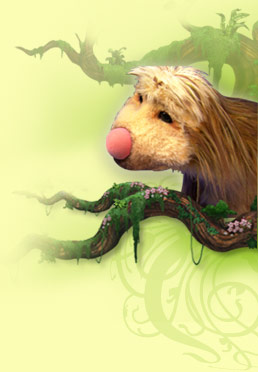|
 |
|
 |
|
|
 |
 |
The goal of IT'S A BIG BIG WORLD is to use engaging characters and compelling stories to captivate children
with life science and geography content. The show's guiding educational principle is that science isn't a
bunch of facts, it's a process of discovery. Through the series, viewers will learn that there is a lot
that they can discover about science, animals, geography, and the big, big world around them.
This spirit of discovery is embodied in the series characters. They are animals who are curious and
model good scientific inquiry, have different ways of approaching problems, and have positive learning habits.
For example, Smooch, the girl monkey, sees herself as a scientist and models the steps and methods of scientific
investigation. Snook, a sloth, is a slow thinker but he is very thorough, thinks big thoughts, and will show
young viewers a character who is excited about science and eager to learn. Madge, a turtle with a library at her
disposal, acts as a fact resource for the animals of the World Tree.
The series is also, on a more basic level, a world of animal characters, who all talk about being animals.
Monkeys talk about monkey characteristics, and how they are different from frogs; the sloth talks about sleeping
upside down, and how his habits differ from other animals. So in relating to these characters, children will be
learning important lessons in biology and about the animals themselves.
|
 |
Through the stories, kids will also discover lots of cool, fun, facts - the kinds of facts that are
fascinating to kids, that will pique their interest, and that will encourage them to ask more questions. Kids
want to know how tadpoles turn into frogs and why some creatures are brightly colored while others are well-camouflaged.
And, much more so than adults, kids aren't put off by big scientific words. Terms like "metamorphosis"
are fascinating to kids, so the series doesn't shy away from using language that kids will love to learn and add
to their vocabulary.
In addition to presenting a life science curriculum, IT'S A BIG BIG WORLD will also address
basic concepts of geography in an appropriate way for this age group. For instance, the idea that
maps are representations of life sized environments, and the symbols on a map correspond to
locations and objects in our world. Focusing on the idea of the world itself as a tangible whole,
where the wonders of nature, animals, and science exist, will enable the series to engender a sense
of the world as a fascinating and positive place. The developmental benefits of having this bigger
sense of the world that geographical awareness provides are key to fostering a sense of security in kids.
It is this bigger sense of the world that provides the overarching theme for the series. Each
episode shows that it really is a big, big world (especially if you are a little kid!). The stories
will inspire curiosity about the many different things there are to be discovered and motivate children
to think about fun science topics like why a monkey can't live in a bird's home or how an ant sees the
world. In examining these mysteries and many more, ITS A BIG BIG WORLD will tap into kids' natural
fascinations, engaging them with real science and encouraging them to explore the world around them
and make discoveries of their own.
|
 |
|
|
|
 |
|
|
|
|
|
|
|
|
|
|
|
|
|
|